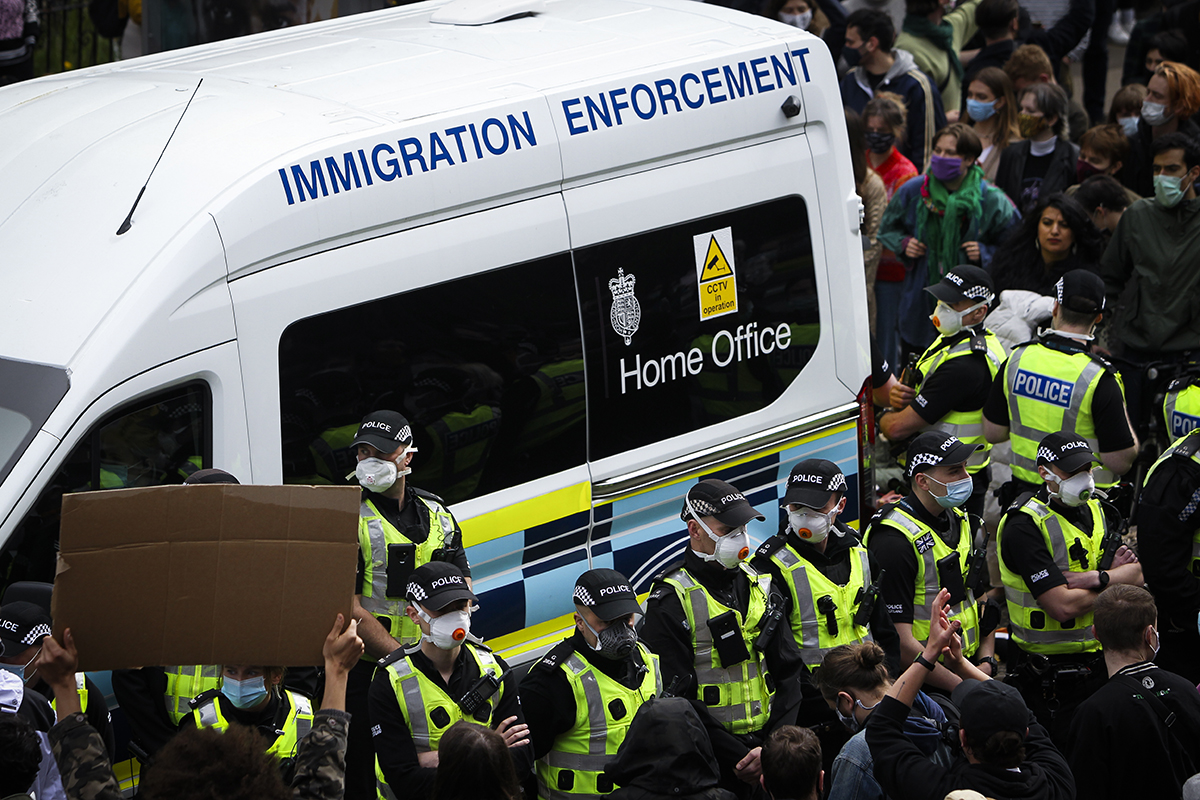Recently, I toured a notable American cathedral that, as a parish, had been founded by pre–Revolutionary War French immigrants. When our group came to a panel that included images of four martyrs who had evangelized different European peoples, our docent told us the story of St. Denis, who took Christianity to the French in the third century. Most representations of St. Denis, including this one, reflect the final episode of his life, in which he walked several miles while preaching despite having been beheaded. So he was depicted in this panel as a headless body holding a severed head. Our docent’s near-apology that such a fantastical event had been memorialized there was met with patronizing head nods—how could anyone other than primitive premoderns ever believe such a preposterous thing?!
More than 1700 years after St. Denis’s martyrdom, France’s political situation is chaotic in the wake of European and National Assembly elections. Marine Le Pen’s National Rally, long a pariah, is now undeniably a mainstream party, having made significant gains in European elections and the national elections that followed. National Rally’s electoral success paralleled gains by similarly controversial parties in other parts of Europe—Geert Wilders’ PVV in the Netherlands, the AUR in Romania, the AfD in Germany, and Georgia Meloni’s Brothers of Italy. Elsewhere, parties like Poland’s Law and Justice and Hungary’s Fidesz have exerted political power for several years. The rightward political shift in continental Europe has been met with alarm across the continent among the elites, with many attempting to undermine these parties in the media and the courts as a means of labeling them extremists.
It likely does not occur to many political analysts in France that the story of St. Denis has any bearing on the political trends they are tracking. How could it? And how many French voters even now know who St. Denis was?
But it has been the central mistake of European electoral politics of the last generation to forget St. Denis and all the other figures, stories, and myths that have defined what it means not to be European but a particular kind of European: What does it mean to be uniquely French and not Spanish or German? What does it mean to be uniquely Polish and not Italian or British? Just like the American docent, too many European peoples have become embarrassed and begun to apologize for their national identities. They were not overly concerned when the European Union’s compound of drab buildings intentionally designed not to reflect a particular European style replaced blocks and blocks of identifiably Belgian buildings in central Brussels. And nobody seemed to care when the House of European History, a museum dedicated to the amalgamation of the history of European peoples into one amorphous pan-European history, opened just behind the European Parliament.
As the nonelite living and working away from capital cities have awakened to this, elections have become—despite what those in power would have anyone believe—much less about policy and political platforms and much more about reasserting national identity. Not every concern about what it means to be French or German or Spanish is an embryonic expression of nationalist homicidal aversion to one’s neighbors. The left elites, the globalists, the EU technocrats, and others who have been in charge for the last generation have quite frankly overplayed their hand, and now the pendulum has swung in ways that are proving to be very difficult to manage.
Interestingly, the rightward shift on the Continent has occurred concurrently with the electoral collapse of the British Conservative Party, the most successful political party in history. The Conservatives suffered a humiliating defeat in national elections that saw a Labour Party surge and capture more than 400 seats in Parliament. But the election results hide the fact that this is not a Labour mandate, although it can easily be interpreted as such. Nigel Farage’s Reform Party divided the vote on the right in such a way that Conservative or Reform candidates often finished second and third with enough combined votes to take the seat. Labour’s share of the vote in 2024 was not much more than their share of the votes in the last national election, in 2019, when then–Prime Minister Boris Johnson led the Conservatives to a stunning victory on the promise to “Get Brexit Done!”
The rightward Continental shift and the Labour insurgency in Britain are related politically and socially even if the result has been to place power in the hands of very different politicians. Britain is on the same path as the rest of Europe, but just one election cycle behind. The rightward lurch in the next election cycle will not be the fault of the left-wing government alone. Fourteen years of largely chaotic Tory rule did not produce improvement in many areas.
The root of the problem is that it is impossible to have reasonable conversations about immigration. The influx of migrants and refugees into Europe since approximately 2015 has had a profound impact on every European nation, but to do anything other than celebrate this or even to gently suggest that present rates are unsustainable is simply impermissible. It is labeled as racist at worst and insensitive at best.
On July 29, in Southport, England, a 17-year-old wielding a knife attacked a group of children and killed three and injured 10 other people. The attacker was a British citizen born to Rwandan parents in Cardiff, Wales. Online speculation that it was a Muslim asylum seeker sparked days of destructive protests by those who oppose mass immigration. In the wake of “mostly peaceful protests” by those on the American left, commentators were quick to remind us that “a riot is the language of the unheard.” While the British rioters were prodded by misinformation in Southport, the kindling that finally caught fire there had already been stacked high by events like the decades-long Rotherham child sex abuse scandal and the London Bridge–Borough Market attack in 2017. Then in 2019, the world watched as a terrorist killed two people on London Bridge as a brave civil servant held him off with a narwhal tusk! The scene was sad for more than one reason—the loss of life, yes, but also because the picture evoked a once-great civilization fighting off its own destruction with tools not fit for use.
It is because England has proved unable to address productively the economic, cultural, and social challenges presented by the influx of immigrants that radical voices have been able to make headway and push genuinely extreme positions into the political mainstream. During the campaign, National Rally effectively promised to ban halal and kosher foods and clothing associated with Muslim communities. In fairness, however, the last French prime minister had already done something similar in French schools while serving as the education minister. These types of solutions are neither real nor sustainable solutions but unproductive reactionary policies. That’s all the French (or the British or the Germans) can expect if the subject remains taboo.
The political and social ban on reasoned discussion not just about immigration but also on what it means to be French or German or British in the context of mass immigration has festered into genuine racism among some bad actors within many of these parties enjoying electoral success. Most are labeled as “anti-immigrant” parties, but all that many of their members want is a chance at public dialogue about how the U.K., for example, could ever manage the more than 100 million people eligible for protection under the laws of the nation of 67 million if they were to show up on British shores.
European nations and peoples are different in important ways. They speak different languages, eat different foods, have different histories, and are defined by different national myths and sources of pride. These unique sources of identity have been overshadowed (and sometimes attacked) by mass immigration and the project of European integration. Until these differences are acknowledged, respected, and protected, any progress that is possible regarding European integration or multiculturalism will be unrealizable, and the frustration it foments will provide cover for the worst impulses among us—sparking increasingly frequent and, possibly, violent riots as more and more voices critical of these trends are left unheard.

